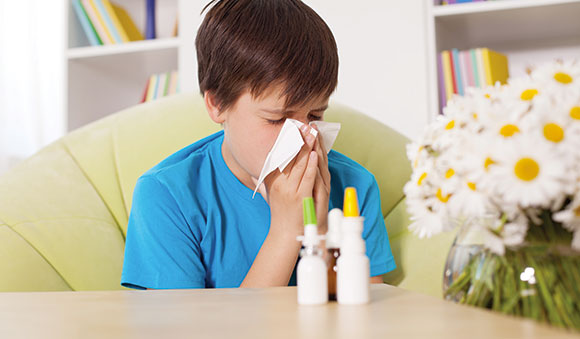With millions of people suffering from seasonal allergies, what treatments can you expect.
Kelsey Hoffman, DO
With the snow melting and weather warming up, we are entering spring time, which means trees budding and flowers blooming. This also means sneezing, runny noses, itchy eyes and many other symptoms for the millions of people who suffer from hay fever, or seasonal allergies.
What are “seasonal allergies” or “hay fever”? Allergies are immune responses to different environmental triggers that the body has become hypersensitive to. In other words, it is the body’s response to substances that it doesn’t like. Most common substances or “allergens” include:
- pollen
- grass
- dust
- mold
- animal dandruff
Different regions across the country have different allergens. This is why people may develop symptoms when they travel, even if they typically don’t struggle with hay fever while at home. While hay fever is most common in the spring and fall, symptoms can occur during any season of the year. Allergies can present at any point as an adult. Many children present with symptoms of seasonal allergies around the ages of four to six. Some will grow out of their allergies symptoms as they get older.
Typically, those who struggle with hay fever complain of runny nose, congestion, itchy and water eyes, rashes or hives, sneezing, and occasionally cough or shortness of breath. Some people are more predisposed to seasonal allergies, but anyone can have seasonal allergies. Certain people are considered “atopic”, or they have a genetic predisposition for allergies. Atopic individuals are prone to hay fever, asthma and dermatitis, also known as eczema, which is a dry, itchy rash.
No testing is required to diagnose seasonal allergies. Most people report they have hay fever because of the symptoms they develop when exposed to allergens or during the typical allergy seasons. If symptoms are severe enough, blood or skin testing can be performed to confirm specific allergens that may need to be avoided. Seasonal allergies are not life threatening, but they can be very disruptive for day to day life.
The most common treatments for hay fever are over the counter antihistamine or decongestant medications, such as Claritin, Zyrtec, and Benadryl. These medications can treat multiple symptoms associated with seasonal allergies. Benadryl is typically more sedating than the other medications. Itchy eyes can be treated with antihistamine eye drops. Allergic rhinitis, or a runny nose, can also be treated with antihistamine or steroid nasal sprays. In rare cases, if symptoms are severe enough, oral steroids may be used for a short period of time. When patients have significant allergy symptoms or react to multiple allergens, a process called desensitization can be used.
To become desensitized to an allergen, one must be repeatedly exposed to gradually increasing doses of the allergen. This is typically managed by an allergist and involves injections given once a week for months to years. Avoiding triggers is the easiest prevention, such as remaining inside during high pollen time, wearing a mask, changing clothes after being outside, or using an air filter.








